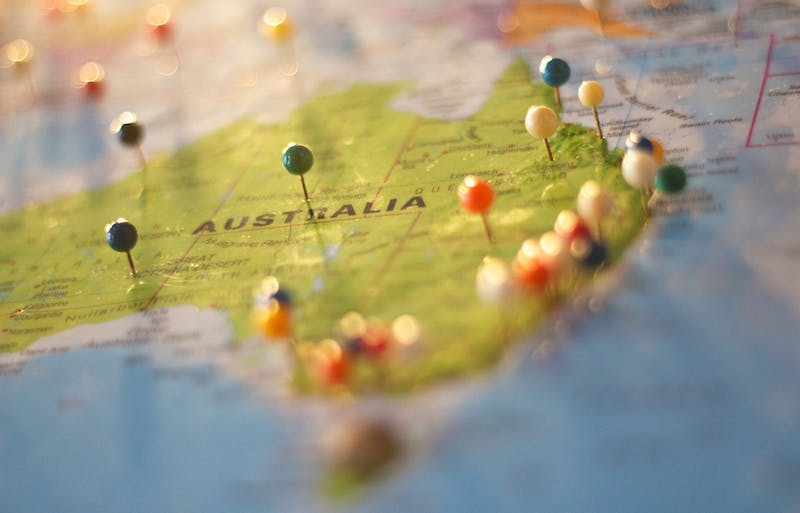- 07 September 2018
- 13 min read
What to know if you're a UK nurse looking to work in Australia
SubscribeOur resident Nurses.co.uk writer, Ruth Underdown, got in touch with Laura Young, a UK nurse who's made the move down under, to find out how nursing in Oz compares with the UK.
 "If you want to come to Australia, getting registered is relatively straight forward"
"If you want to come to Australia, getting registered is relatively straight forward"Ruth asks the questions, Laura answers.
What's your background?
I qualified from the University of Stirling in 2008 with a BSc in Adult Nursing.
After that, I moved to Milton Keynes where I worked in the hospital for 4 years in several areas including a Coronary Care Unit (CCU) and the Emergency Department (ED).
I then took a year out travelling late in 2012 with my partner. We continued our travels onto Australia, arriving in June 2013 where I originally planned to take a break from nursing as I didn’t want the stresses of the job taking over my gap year.
However, after working as a healthcare assistant in Melbourne for a few months, I began to see how different nursing was in Australia, and I decided to go for my registration.
I missed nursing, and was also becoming aware that if I took more time off, I would have to do a return to practice (a course undertaken to re-join the register where required practice hours haven’t been met).

What Preparation do you need to do?
If you want to come to Australia, getting registered is relatively straight forward. I applied for my transcripts from university, along with the usual documents such as a resume, references and proof of hours worked.
I also needed my secondary school to write me a letter stating that I had been taught GCSE English for at least 4 years.
Additionally, I had to undergo a medical, which consisted of a physical exam, chest X-ray and blood tests.
Once this was submitted the process didn’t take very long at all.
One thing to consider would be that Australia requires you to hold a degree in nursing and no longer accepts diplomas, unless a bridging course or studying to be a nurse can be obtained.









About this contributor
Adult Nurse
Since qualifying in Adult Nursing in 2002 I’ve worked as a specialist nurse with the NHS, and in the private sector as a general nurse and sessional nurse for a hospital at home team (I’ve been about a bit!).
More by this contributorWant to get involved in the discussion?
Log In Subscribe to commentLilian Kufakunesu
Lilian Kufakunesu
2 years agoI am in UK for only 6 months and already drained down by the NHS.Nurses are not supported by the ... read more
I am in UK for only 6 months and already drained down by the NHS.Nurses are not supported by the government here.They are drained and burnt out that the Nursing proffession has already lost its value.I am an International nurse but I already miss my nursing back home
read less
Sophie Couch
Sophie Couch
2 years agoHi, I am currently a RN here in the Uk. I’m planning on travelling to Australia mid next year and eventually ... read more
Hi, I am currently a RN here in the Uk. I’m planning on travelling to Australia mid next year and eventually nursing over there. My plan would be to move back home after a year or so but wanted if anyone knew about what happens to the nurses pay once you’ve been out of the NHS for a couple of years? Or if I show evidence then I’ve been working as a nurse elsewhere would it not matter?
read less
W Brown
W Brown
3 years agoHow easy or difficult is it to move to Australia with a child and a single parent. It appears cost ... read more
How easy or difficult is it to move to Australia with a child and a single parent. It appears cost of living is much higher. Are their companies to help relocate I.e accommodation, jobs etc? Almost need a checklist of things to consider before a move. Could you help please ?, great article x
read less
Shannon Bradley
Shannon Bradley
3 years agoHello, I am looking for further information and assistance with this, could you please send me an email at sbrad30@hotmail.com Any ... read more
Hello, I am looking for further information and assistance with this, could you please send me an email at sbrad30@hotmail.com Any help is much appreciated Thank you, Shannon.
read less
Kristin Keane
Kristin Keane
4 years agoHi Ruth, I am currently a community nurse but have acute hospital experience too. Please May I have more information ... read more
Hi Ruth, I am currently a community nurse but have acute hospital experience too. Please May I have more information regarding how to find employment in Australia. I also wanted more information regarding cost of emigrating and whether the hospital/agencies help you find accommodation? Thank you
read less
Thandie Much
Thandie Much
4 years agoHi Ruth, I am just wondering if you can please give more infor on Nursing progression in Australia . I ... read more
Hi Ruth, I am just wondering if you can please give more infor on Nursing progression in Australia . I am a band 5 at the moment wanting to be an Advanced Nurse Practitioner, but at the same time wanting to leave the UK for Australia. Do you think I will be able to peruse this if I come? Or Should I just do the masters here. Thanks for you help. Thandie
read less
Charley-Mae Symonds
Charley-Mae Symonds
4 years agoHello, I was wondering if you could help me. I am wondering about how I go about getting a nursing ... read more
Hello, I was wondering if you could help me. I am wondering about how I go about getting a nursing assistant job In Australia? I am currently a nursing assistant in the UK and have been since I was 16 (started as a nursing assistant apprentice). I am absolutely desperate to do this job elsewhere and aus/nz are on my list. Hope you can help. If you wouldn’t mind, could you drop me and email with you advice as I have never used this sight before and don’t really know how this works! My email is charleysymonds2000@yahoo.co.uk
read less